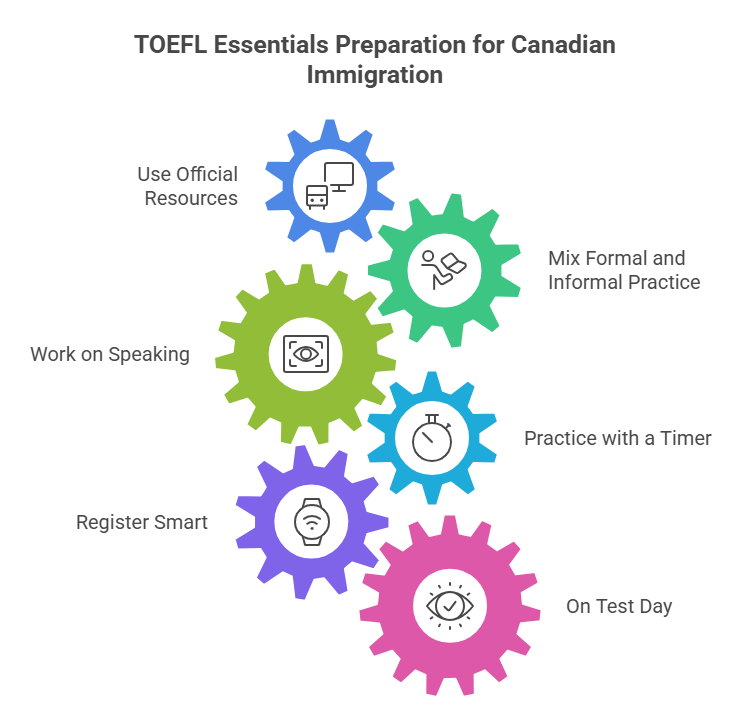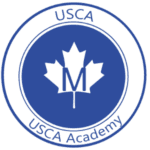Key Highlights of TOEFL Essentials Canada Immigration
- TOEFL Essentials Canada Immigration is now officially recognized for certain immigration and study pathways in 2025.
- Compared to TOEFL iBT, it’s shorter, more flexible, and easier on the pocket great for Express Entry, study permits, and some work permits.
- The test measures both day-to-day communication and academic English, which makes it especially useful for newcomers to Canada.
- Many TOEFL accepted universities in Canada now include Essentials in their admission lists, though not every program treats it the same.
- A solid TOEFL score for Canada can help raise your CRS points under Express Entry, improving your odds of getting selected.
- You can retake it often every 3 days if needed which gives you plenty of chances to boost your results.
Introduction
If Canada is part of your future plans whether to study, work, or settle permanently one thing you can’t avoid is proving your English proficiency. For years, people mostly turned to IELTS or TOEFL iBT, but recently, a new option has been gaining attention: TOEFL Essentials Canada Immigration.
This test is designed to be more approachable and reflects both academic and everyday English skills, which is exactly what Canadian immigration programs are looking for. In this guide, we’ll break down how TOEFL Essentials works in 2025, TOEFL Canada requirements, how it compares with IELTS, which universities accept it, and what you need to do to prepare.
TOEFL Essentials Canada Immigration – Key Facts and Overview
TOEFL Essentials is designed to be both practical and flexible, making it easier for international students and immigrants to showcase their English skills. Institutions such as USCA Academy, which works closely with international applicants, often guide students on choosing the right test for their goals.
Understanding TOEFL Essentials and Its Role in Canadian Immigration
ETS introduced TOEFL Essentials as a lighter, faster version of TOEFL iBT. The idea is simple: not every applicant needs a test that only measures complex academic English. For immigration, you need to prove you can handle formal study situations but also day-to-day conversations and TOEFL Essentials blends both.
For someone aiming to study in Canada, this makes sense. You’ll need to understand professors, yes, but you’ll also need to order food, chat with classmates, or join meetings at work. TOEFL Essentials is built to check if you can do all of that, which makes it a practical Canadian immigration English test.
Acceptance by IRCC and Canadian Institutions
As of 2025, Immigration, Refugees, and Citizenship Canada (IRCC) does accept TOEFL Essentials for certain streams. And on the education side, a growing number of TOEFL accepted universities in Canada now list it as an approved test.
That said, it’s not a one-size-fits-all situation. Some highly competitive programs think law, medicine, or graduate research still lean on TOEFL iBT or IELTS. If you’re applying to those, double-check the TOEFL Canada requirements before choosing your test.
Main Differences Between TOEFL Essentials and TOEFL iBT for Canada
The choice between the two often depends on whether you’re applying for academic programs or immigration streams. Many education consultants, including schools like USCA Academy, help students weigh these options based on long-term career plans.
Test Format, Scoring, and Which Test to Choose
At first glance, both TOEFL tests seem similar, but once you compare, the differences stand out:
- Length: TOEFL Essentials takes about 90 minutes, while TOEFL iBT stretches close to 3 hours.
- Content: TOEFL iBT is academic through and through. TOEFL Essentials mixes academic tasks with everyday scenarios.
- Scoring: Both use section-based scores, but Essentials is adaptive your next question depends on how you answered the last one.
- Mode: TOEFL Essentials is fully online, while iBT can be taken at centers or at home with tighter rules.
So which one is better? If you’re applying for general immigration or undergraduate programs, TOEFL Essentials will usually do the job. But if your target is a graduate-level program or a field where academic English is critical, TOEFL iBT is safer.
This comparison also plays into the ongoing TOEFL vs IELTS Canada debate, since many applicants want the fastest, most widely accepted option for their immigration journey.
TOEFL Essentials Requirements for Canadian Immigration Programs
Understanding the minimum score needed is key, since requirements are not the same across all programs. Think of this step as building a foundation you want to know where you stand before you even start preparing.
Minimum Score Requirements and Valid Immigration Streams
Unlike a school exam, TOEFL Essentials doesn’t have a universal “pass” score. What you need depends on the program:
- Express Entry: Equivalent to CLB 7 or above, which translates to a mid-to-high TOEFL score for Canada.
- Study Permits: Universities often look for something equal to 6.5–7.5 (IELTS bands) overall.
- Work Permits and Provincial Programs: Requirements differ, but balance across all four skills reading, writing, listening, speaking is usually expected.
Accepted Immigration Streams (Express Entry, Study Permits, and More)
Here’s where you can use TOEFL Essentials:
- Express Entry: Helps prove English skills and adds to your CRS points.
- Study Permits: Accepted at many TOEFL accepted universities in Canada, colleges, and technical institutes.
- Provincial Nominee Programs (PNPs): Several provinces accept TOEFL scores, including Essentials.
- Work Permits: If proof of English is part of the process, Essentials is now a recognized Canadian immigration English test.
Preparation Tips for TOEFL Essentials for Canadian Immigration

Getting ready for the test is less about memorization and more about practicing in real situations. Even small, consistent practice sessions can make a big difference over time.
Recommended Study Materials, Registration, and Test-Day Strategies
Getting ready for TOEFL Essentials doesn’t have to be overwhelming. Here are some simple steps that work:
- Use ETS’s Official Resources – Their practice tests and prep kits are closest to the real thing. These also serve as reliable TOEFL practice resources.
- Mix Formal and Informal Practice – Read Canadian newspapers, practice small talk in English, and try short essays. Great for building a personal TOEFL study guide.
- Work on Speaking – Since your answers are recorded, focus on clear, natural speech rather than speed.
- Practice with a Timer – Sit down for a full mock test to get used to the TOEFL test format Canada.
- Register Smart – Sign up through the ETS site, pick a date that works for your time zone, and make sure your computer setup meets the requirements. This makes TOEFL registration Canada smooth.
- On Test Day – Stay calm. Keep your room quiet, double-check your internet connection, and keep your ID handy.
Preparation is less about memorizing and more about building confidence in real-world English. These small TOEFL exam tips can make a big difference for international applicants.
TOEFL vs IELTS for Canada Immigration
One of the biggest questions applicants ask is: “Should I take IELTS or TOEFL Essentials?”
Here’s the quick breakdown:
- IELTS General Training is still the go-to for immigration worldwide, and Canada is no exception.
- TOEFL Essentials is catching up shorter, more modern, and officially recognized by IRCC.
How They Compare:
- Test Style: IELTS offers paper-based and computer-based versions; TOEFL Essentials is only online.
- Length: IELTS runs close to 3 hours; TOEFL Essentials just 90 minutes.
- Focus: IELTS General looks mainly at workplace and daily communication. TOEFL Essentials does that plus academic skills.
- Recognition: IELTS is accepted everywhere; TOEFL Essentials is accepted widely but not universally (yet).
If you want the safest choice, IELTS wins. If you prefer a shorter, adaptive online test, TOEFL Essentials could be your best bet especially for international students looking at Canadian immigration.
Conclusion
To sum it up, TOEFL Essentials Canada Immigration has quickly become a serious option for anyone moving to or studying in Canada in 2025. It’s shorter, affordable, and designed to reflect both classroom and real-life English. Best of all, it’s recognized by IRCC and a growing number of TOEFL accepted universities in Canada.
But there’s one thing to remember: acceptance still varies. Before booking the test, always check the exact TOEFL Canada requirements of your program or immigration stream.
For many international students, though, TOEFL Essentials is more than just a test it’s a gateway to building a new life in Canada. With the right TOEFL study guide, practice resources, and smart preparation, it can help you gain the CRS points, secure your study permit, and take one step closer to your Canadian dream.
1. How does TOEFL Essentials impact CRS points?
Your score can directly add to your CRS points under Express Entry. Higher section scores mean more points, which improves your chances of being invited to apply.
2. How does TOEFL Essentials compare with other English tests for immigration?
It’s quicker and more flexible than TOEFL iBT, and often less stressful than IELTS. But IELTS still holds the widest global recognition.
3. Do all Canadian institutions accept TOEFL Essentials equally?
Not quite. Many do, but some elite programs still prefer TOEFL iBT or IELTS. Always confirm with your chosen school’s TOEFL Canada requirements.
4. How often can I retake TOEFL Essentials?
As often as you want just keep a 3-day gap between test dates.
5. What is the TOEFL validity Canada timeline?
A TOEFL score is valid for two years in Canada, just like IELTS. Make sure your results are still active when applying.









